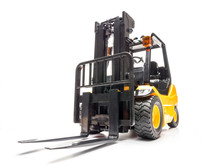Forklift Manufacturers: A Legacy of Excellence
Forklift Manufacturers: A Legacy of Excellence
Blog Article

In the world of manufacturing and logistics, forklift manufacturers play a crucial role in shaping the efficiency and productivity of various industries. These machines are not just tools; they represent a blend of engineering excellence and innovative design that has evolved over decades. As businesses strive to optimize their operations, the importance of reliable and advanced forklifts becomes increasingly evident.
Request A Demo
The legacy of excellence in forklift manufacturing is marked by a commitment to quality, safety, and service. Companies in this sector have consistently pushed the boundaries of technology, ensuring that their machines can handle the demands of modern warehousing and construction environments. From electric forklifts that promote sustainability to robust models designed for heavy lifting, these manufacturers have established themselves as leaders in providing solutions that keep industries moving forward. Understanding the history and advancements of forklift manufacturers offers valuable insights into their continuous pursuit of excellence.
History of Forklift Manufacturing
The history of forklift manufacturing dates back to the early 20th century, when the need for efficient material handling solutions became apparent in industrial settings. The introduction of powered cranes and hoists set the groundwork for what would evolve into the modern forklift. In the 1920s, manufacturers like Yale & Towne and Clark Equipment began experimenting with different designs, leading to the development of the first true forklifts that utilized a combination of lift mechanisms and wheels for mobility.
As industries expanded during World War II, so did the demand for efficient transport and handling equipment. This period saw significant advancements in forklift technology, including the introduction of electric and internal combustion engines. Companies swiftly adapted their designs to meet the growing needs of warehouses and distribution centers, allowing for greater lift capacities and improved ergonomics. Innovations in materials also contributed to the reliability and efficiency of forklifts, making them indispensable in various sectors.
By the 1960s, forklift manufacturing had established itself as a crucial component of the logistics and supply chain industries. Several iconic brands emerged, each contributing unique features and designs that catered to diverse operational requirements. The competition among manufacturers fostered continuous improvements in safety, performance, and ease of use, leading to the sophisticated forklift models we see today. This legacy of engineering excellence has shaped the way materials are handled across the globe.
Key Players in the Industry
The forklift manufacturing industry is dominated by several key players that have established a strong presence in the market through innovation and reliability. Companies like Toyota Industries Corporation lead the way, known for their commitment to quality and advanced technology. Toyota forklifts are synonymous with durability and efficiency, making them a favored choice among businesses of all sizes. Their extensive range of electric and internal combustion forklifts caters to various industries, showcasing their adaptability and expertise.
Another major player is Hyster-Yale Materials Handling, Inc., which operates globally and offers a wide assortment of forklift models designed for diverse applications. Hyster and Yale brands are recognized for their robust engineering and customer-focused solutions. These companies emphasize sustainability and have developed electric forklifts that reduce emissions while maintaining powerful performance. Their ongoing investment in research and development ensures they remain at the forefront of the industry.
Finally, Crown Equipment Corporation stands out for its innovative approach and emphasis on ergonomic designs. Crown's commitment to quality and its focus on creating user-friendly products have earned the company a loyal customer base. With a variety of forklifts that include advanced technology such as integrated safety features and energy-efficient models, Crown continues to redefine industry standards. These key players are instrumental in shaping the future of forklift manufacturing, driving advancements that benefit both operators and businesses alike.
Innovations and Future Trends
The forklift industry is undergoing significant transformations driven by advancements in technology. Electric and hybrid models are gaining popularity due to their lower environmental impact and operational costs. Manufacturers are focusing on developing more energy-efficient batteries that extend operational time and reduce charging time, which enhances productivity in warehouses and construction sites. Additionally, smart technology integration, such as IoT connectivity, is enabling real-time monitoring and data collection, allowing operators to optimize their fleet management.
Automation is another key trend shaping the future of forklift manufacturing. The introduction of autonomous forklifts is revolutionizing how materials are handled in various industries. These self-driving machines are designed to improve efficiency and safety by reducing human error. As manufacturers invest in advanced sensors and artificial intelligence, we can expect to see increased adoption of automated solutions that complement traditional forklift operations, further streamlining logistics and supply chain processes.
Safety remains a top priority for forklift manufacturers as they innovate. Enhanced safety features, such as advanced collision avoidance systems and improved visibility designs, are being integrated into new models. Additionally, virtual training programs and simulation technologies are emerging as effective ways to train operators, ensuring they are well-prepared to handle modern forklifts safely. These innovations not only enhance operator safety but also contribute to a more efficient overall work environment, positioning forklift manufacturers at the forefront of industry evolution.
Report this page